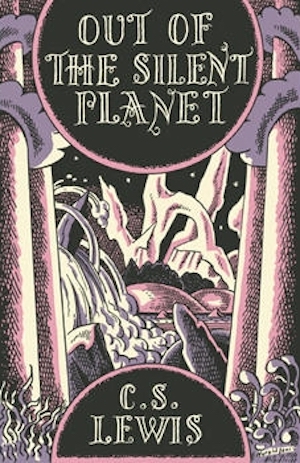We’ve spent some time already talking about Out of the Silent Planet as a critique of colonialism in the science fiction of Lewis’ time, and part of that critique is showing the “savages” on Mars to be part of a utopian society that’s not in any need of improvement that human beings can bring. “Utopia” is fun wordplay in Greek, meaning “no place” (as in, it doesn’t exist), as well as being a near homophone for “Good Place” (not referring to the sitcom). Thomas More coined the word in 1516, in his book of the same name, about an island culture where everyone gets along more or less. It’s unclear if he was serious or being satirical or maybe both.
This last week, I stumbled on an essay of Lewis’ that I didn’t recall well, and it’s directly on point for the Space Trilogy. It’s called “The Seeing Eye,” and though he wrote this long after Out of the Silent Planet, I want to quote one section at length, as it illuminates Lewis’ feelings about space travel and the dangers of human beings setting out into new planetary spheres:
The balance of probability is against life on any other planet of the solar system. We shall hardly find it nearer than the stars. (…)This thought is welcome to me because, to be frank, I have no pleasure in looking forward to a meeting between humanity and any alien rational species. I observe how the white man has hitherto treated the black, and how, even among civilized men, the stronger have treated the weaker. If we encounter in the depth of space a race, however innocent and amiable, which is technologically weaker than ourselves, I do not doubt that the same revolting story will be repeated. We shall enslave, deceive, exploit or exterminate; at the very least we shall corrupt it with our vices and infect it with our diseases. We are not fit yet to visit other worlds. We have filled our own with massacre, torture, syphilis, famine, dust bowls and with all that is hideous to ear or eye. Must we go on to infect new realms?
Lewis obviously didn’t think much of our chances of being a positive influence on a galactic scale. What’s fascinating about Out of the Silent Planet is that it’s heavily influenced by Plato’s Republic, showing a society with three major roles (which are, on Malacandra, fulfilled by the three different types of hnau on the planet), each of which plays a part in keeping the balance of the State. I have to admit, as I was digging deeper into this last week and re-reading The Republic, I was a bit overwhelmed by how much of Plato’s work is directly referenced in Out of the Silent Planet. I have no doubt someone will get their doctorate teasing more of this out (if they haven’t already!). But here we see Lewis’ ideal society coming into conflict with our own broken people.
I’m not a Plato scholar, and I’m certain there are folks here with greater fluency in Platonic thought and philosophy, but it’s interesting that The Republic is a Socratic dialogue about the just society and also what it means to be a just person, and of course Ransom is on a journey of discovering many of the same things as he learns that he and humanity are “bent” and he learns the language of being hnau. We also have references to the sun, and a cave with shadows on the wall. We have a lot of talk about the visible and invisible realms (or, as Plato would say, the invisible vs. the “intelligible”). And much of the dialogue of the novel—especially as we reach the climax—falls into patterns that feel familiar to those who enjoy Greek thought and philosophy. There’s a lot of talk of moderation, and even a reference to how procreation should be done with full awareness of and deference toward the needs of the greater community, both topics The Republic spends a decent amount of time discussing. I think you could make a compelling argument that the three human characters fall into Plato’s three character types (money-loving, honor-loving, and truth-loving).
Buy the Book


Comfort Me With Apples
Lewis’ utopian planet has some strong, easily observed connections to The Republic. Each of the alien races corresponds to a Platonic class. So, we have the hrossa, our farmers and fishermen and warriors, who produce food as well as protecting the world from the hnakra when he swims into the territories where hrossa live. Plato has this class as well, and depending on your translation they may be called soldiers or warriors or auxiliaries.
Plato also has the producers or artisans, those who make things (in the Republic, these are actually the farmers as well, so there’s some bleed over here in Lewis’ world). These are, of course, the pfifltriggi, who live in the lower reaches of the planet. “They delight in digging. What they dig they soften with fire and make things of it.” And of course, “No hnau can match them in making and shaping things as none can match us in singing.” What do they make? Well, pretty much whatever you can imagine, if it’s interesting enough. The séroni say that, “It is true they like best the making of things that are only good to look at and of no use. But sometimes when they are tired of that they will make things for us, things we have thought, provided they are difficult enough. They have not patience to make easy things however useful they would be.” When Ransom questions why they would make things for the other hnau, he’s told frankly, “They like to make things.” Every group does what they love most.
And the séroni most love philosophy and learning. They are the Platonic category of the guardians, or rulers. The philosopher kings. Here’s where Lewis will make his great departure from the Platonic utopia. The séroni live in the higher parts of the planet, where the air is thinnest. When a hrossa doesn’t know the answer to some question of Ransom’s, they’ll always say, “The séroni would know.” They’re the keepers of knowledge, the scholarly class, the thinkers and guardians of knowledge. As the hrossa say, “the séroni or sorns were perfectly helpless in a boat, and could not fish to save their lives, could hardly swim, could make no poetry, and even when hrossa had made it for them could understand only the inferior sorts; but they were admittedly good at finding out things about the stars and understanding the darker utterances of Oyarsa and telling what happened in Malacandra long ago—longer ago than anyone could remember.” The intelligentsia, Ransom concludes, and he’s not wrong.
Ransom immediately falls into the expectations of the Platonic pattern. If the séroni are the intelligentsia, then certainly they must rule the planet. It’s part of the role of the philosophers, the expectation of those with the most knowledge, that they would take upon themselves the burden of caring for the rest of society. But of course that is not the case in Malacandra. In Malacandra, Oyarsa rules.
And Oyarsa is not so much a philosopher king as he is a representative of beneficent religious power. For us bent folks here on Thulcandra this is about as foreign as the idea that there would be three classes of creatures who all get along perfectly fine, never kill each other, and are deeply satisfied in their roles in the world. But Oyarsa is a person, the greatest of the eldila on Malacandra (or so we are told by the séroni). The eldila are, more or less, the angels of Lewis’ fictional world.
Oyarsa rules all the people. He intervenes if there is a creature who becomes bent. He doesn’t die, doesn’t have children, doesn’t marry. His role is purely to care for the hnau of Malacandra, and it’s a role he seems to take pleasure in. And he, of course, is not the highest cosmic authority—he reports to the God-figure of this universe, Maleldil.
In fact, the séroni are certain that the societal problems of Earth—war, violence, slavery—are the result of our either having a bent Oyarsa, or a desire to subvert the natural order and become Oyarsa ourselves:
‘It is because they have no Oyarsa,’ said one of the pupils.
‘It is because every one of them wants to be a little Oyarsa himself,’ said Augray.
‘They cannot help it,’ said the old sorn. ‘There must be rule, yet how can creatures rule themselves? Beasts must be ruled by hnau and hnau by eldila and eldila by Maleldil. These creatures have no eldila. They are like one trying to lift himself by his own hair—or one trying to see over a whole country when he is on a level with it—like a female trying to beget young on herself.’
That’s Lewis’ big switch when it comes to the utopia of The Republic. It’s not that we need a benevolent philosopher king, but that we need something or someone above that, someone from the world of perfect Forms, nearly invisible, who can shape and guide us in who and what we should be as a people and even as individuals.
Plato goes on from his description of the perfect, just society to discuss what we call the “tripartite soul”… the idea that a healthy human has three corresponding pieces to their soul which also must live in harmony. Reason must rule, Spirit aids Reason, and Appetite obeys the higher parts of the soul. We won’t go too much into that, but we can see the attributes of these three parts of the soul in Lewis’ description of the hnau of Malacandra. The séroni are deeply committed to reason. The hrossa are full of deep passions, and singing, and the love of a clean battle against those who would do harm. The pfifltriggi only do precisely what they please, specializing in beautiful but useless things, and will make new things for the others only when they’re tired.
I had no idea when I started re-reading The Republic how much of it was being directly addressed in Out of the Silent Planet. It was a fun new light on the story for me, to see Lewis in conversation with Plato in this imaginative way. And there’s one more fun bit where Out of the Silent Planet echoes The Republic.
The Republic ends on a surprising note: Plato suggests that all poets should be banished. In a just society, a utopia, the poet tells stories that may cause us to have unjust emotions, or to have sympathy for those who do unjust things in stories. So they must be removed to protect the city. Lewis has made a big deal about the hrossa being poets, so obviously he doesn’t agree with that as a general rule, but it’s interesting that the climactic solution to the problem of humanity in Malacandra is to banish the humans. It would be wrong to unmake someone else’s hnau, so the best solution is to send them back to their backwards, silent, bent home.
We’ll wrap up Out of the Silent Planet in two weeks with a discussion of Ransom’s attempts to translate humanity into the language of hnau! In the meantime, I would love to hear your own thoughts and insights about Plato and Out of the Silent Planet, and please remember to treat other hnau with the respect and kindness they deserve!
 Matt Mikalatos is the author of the YA fantasy The Crescent Stone. You can follow him on Twitter or connect on Facebook.
Matt Mikalatos is the author of the YA fantasy The Crescent Stone. You can follow him on Twitter or connect on Facebook.










